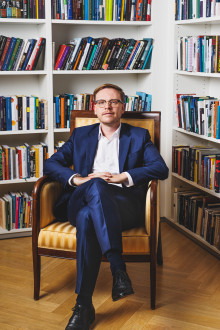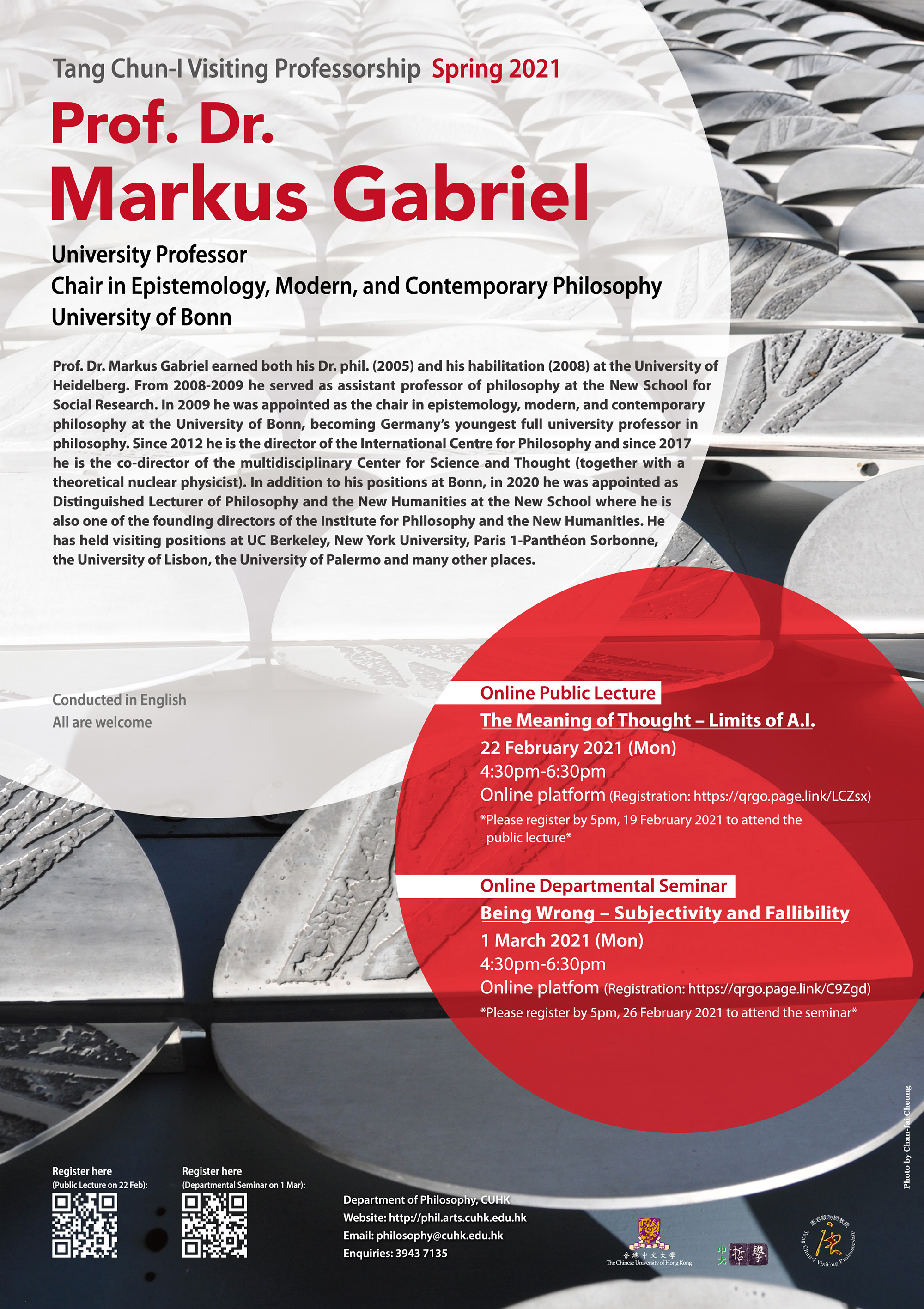
Markus Gabriel
Prof. Dr. Markus Gabriel
University Professor
Chair in Epistemology, Modern and Contemporary Philosophy
University of Bonn
Prof. Dr. Markus Gabriel earned both his Dr. phil. (2005) and his habilitation (2008) at the University of Heidelberg. From 2008-2009 he served as assistant professor of philosophy at the New School for Social Research. In 2009 he was appointed as the chair in epistemology, modern, and contemporary philosophy at the University of Bonn, becoming Germany’s youngest full university professor in philosophy. Since 2012 he is the director of the International Centre for Philosophy and since 2017 he is the co-director of the multidisciplinary Center for Science and Thought (together with a theoretical nuclear physicist). In addition to his positions at Bonn, in 2020 he was appointed as Distinguished Lecturer of Philosophy and the New Humanities at the New School where he is also one of the founding directors of the Institute for Philosophy and the New Humanities. He has held visiting positions at UC Berkeley, New York University, Paris 1-Panthéon Sorbonne, the University of Lisbon, the University of Palermo and many other places.
Selected Bibliography
Der Mensch im Mythos. Untersuchungen über Ontotheologie, Anthropologie und Selbstbewußtseinsgeschichte in Schellings „Philosophie der Mythologie“. Berlin/Boston: De Gruyter 2006.
Skeptizismus und Idealismus in der Antike. Frankfurt am Main: Suhrkamp 2009.
Why the World does not Exist. Cambridge: Polity Press 2014.
Fields of Sense. A New Realist Ontology. Edinburgh: Edinburgh University Press 2015.
I am not a Brain: Philosophy of Mind for the 21st Century. Cambridge: Polity Press 2015.
The Limits of Epistemology. Cambridge: Polity Press 2019.
The Meaning of Thought. Cambridge: Polity Press 2020.
Fiktionen. Berlin: Suhrkamp 2020.
The Meaning of Thought – Limits of A.I.

Please register by 5pm, 19 February 2021 to attend the public lecture.
Recording (Passcode: 1$f!5&lj)
Abstract:
Much contemporary artificial intelligence (A.I.) research neglects to investigate the nature of its key object of study: intelligence. In this lecture, I intend to compensate for this neglect by offering an ontology of intelligence so as to determine to which extent A.I.-systems can be rightly described as intelligent. A.I. research frequently operates with an “efficiency” sense of intelligence, which associates this property with a system’s measurable problem-solving capacity. By invoking the thesis of biological externalism, according to which our mentalistic vocabulary is essentially tied to picking out behaviors of biological life forms, I argue that ascriptions of mental properties to non-living systems are categorially inappropriate, given how relating to a problem space to begin with necessarily builds on indispensable biological parameters. In this context, I will argue that A.I.-systems are thought-models, which should not be understood as thinking-models: it makes no sense to attribute intelligence to such models outside of the context of our intelligent use of them for our own problem-solving ends. The actual bearer of intelligence in A.I.-systems, thus, turns out to be the hybrid human-machine-interface which is structured by both human use of technology and A.I.-programs. Finally, I maintain that thought itself is a sense modality, which is bound to inherently contextual forms of understanding and that these cannot be replaced by any kind of non-biological A.I.-system.
Delieved in English
All are welcome
Existence, Non-Existence, Fiction and the Imagination
26/2 (Fri.), 2:30 – 5:15pm, Zoom
5/3 (Fri.), 2:30 – 5:15pm, Zoom
12/3 (Fri.), 2:30 – 5:15pm, Zoom
There are many things: Classrooms, bosons, neurons, numbers, justice, time etc. At the same time, there also seem to be things whose existence can be disputed: values, colors, consciousness, God(s) and so forth. But what exactly are we asserting or denying when we ascribe existence or non- existence to some class of entities? What is it for them to exist or not to exist respectively? Specifically, how is it possible to refer to fictional and imaginary objects (such as literary characters and systematically distorted sensory presentations of ordinary objects of perception, not to mention hallucinated objects) without thereby overturning their alleged ontic status as non-existent? Ever since the founding gesture of philosophy, the concept of being has been threatened by a paradox, most prominently articulated in the Eleatics. The paradox culminates in the conclusion that it is impossible for anything not to be/not to exist in virtue of the fact that any assertion of its non-existence entails its existence qua target of an intentional state directed at the entity or kind of entity charged with non-existence.
In this course, we will look at various formulations of the paradox in order to become acquainted with contemporary strategies of solving or re-solving it by way of ontological theory-construction designed to make sense of assertions both of existence and non-existence alike. In this context, we will discuss the ontology of fictional and imaginary objects, because they can easily be used as litmus tests for the various ontological frameworks on offer in contemporary philosophy with a focus on so-called New Realism.
Being Wrong – Subjectivity and Fallibility

Please register by 5pm, 26 February 2021 to attend the departmental seminar.
Recording (Passcode: 3C+?jLso)
Abstract:
We are evidently capable of knowing how things are. In indefinitely many cases, how things are is implicitly or explicitly open to human thought and action. Reality is unconcealed. Yet, by virtue of our very ability to know, we are at the same time aware of the fact that we sometimes get things wrong. We are fallible. In my departmental lecture I will investigate the nature and scope of our fallibility on the basis of an assumption about subjectivity. This subjectivity assumption maintains that to be a fallible thinker means that we are subject to a constitutive and often wide-ranging ignorance as to which of our beliefs are actually true and which false. To be a subject is to be wrong about some things without ever being in a position to settle once and for all which of our beliefs are non-accidentally true (and thereby constitute knowledge) and which of our actions are morally good.
In my lecture, I will argue that human subjects are not only fallible knowers, capable of getting things right or wrong. Rather, what constitutes our individual perspective on reality (including on our individual perspective, which also belongs to what there is), is the fact that we are never in a position to set our epistemic record straight once and for all. We cannot replace all our false beliefs with true ones. To be someone is thus to be a bearer of false beliefs many of which remain undetected. If we had only true beliefs, we would merge with reality. Being and thought would form an indissoluble whole. Thus, being someone puts us at a partial distance from what there is, a distance which itself belongs to what there is. In light of these considerations, I will propose an epistemic account of reality according to which the category reality is essentially tied to our self-portrait as fallible thinkers. This will shed new light on the issue of realism in epistemology and ontology.
Delieved in English
All are welcome



